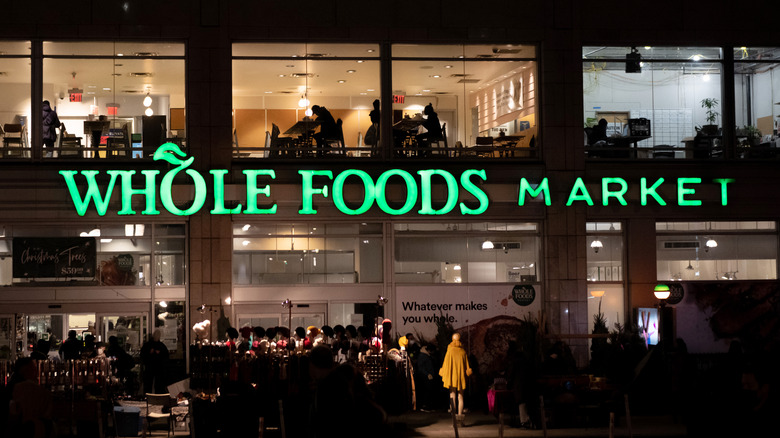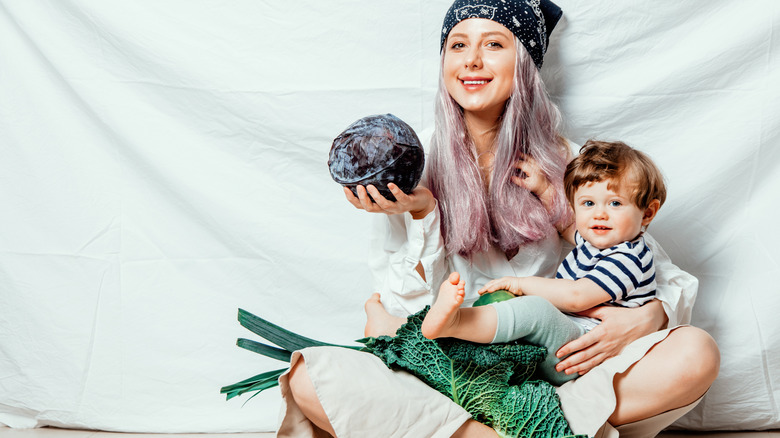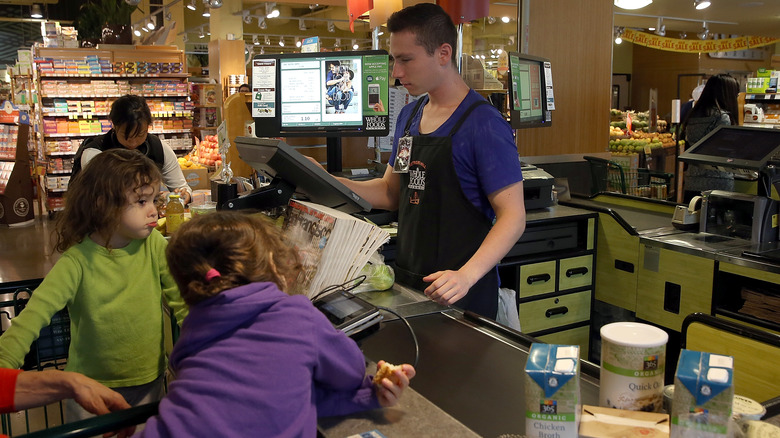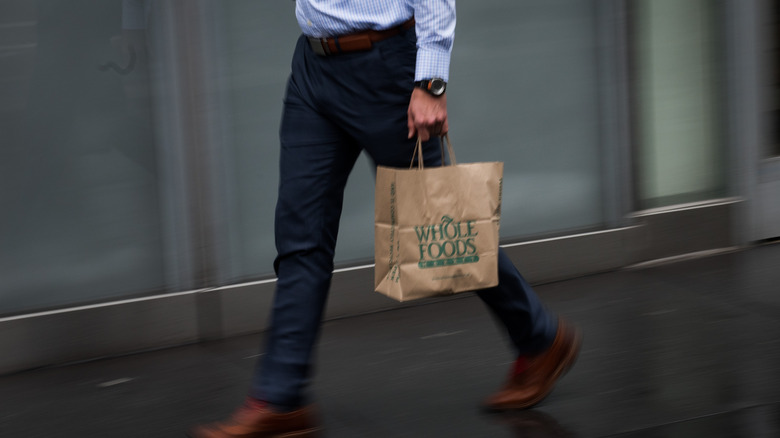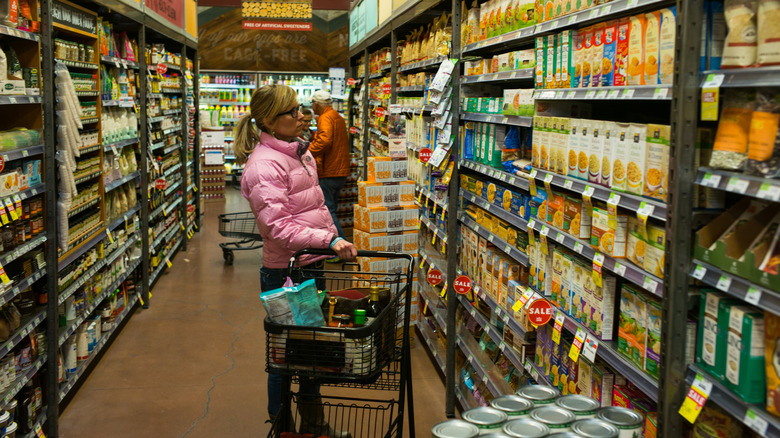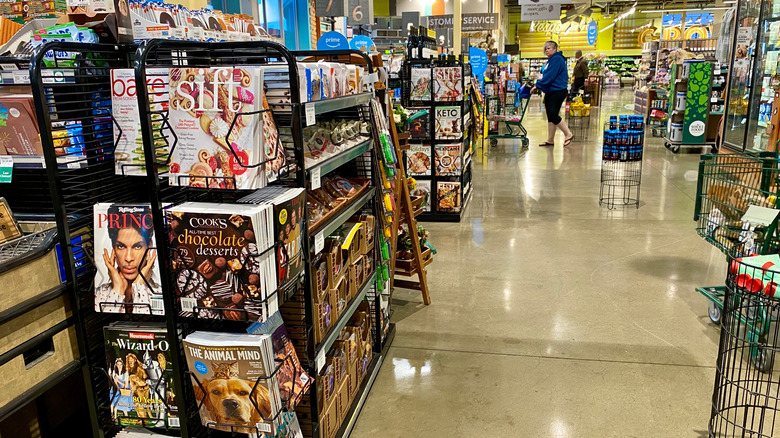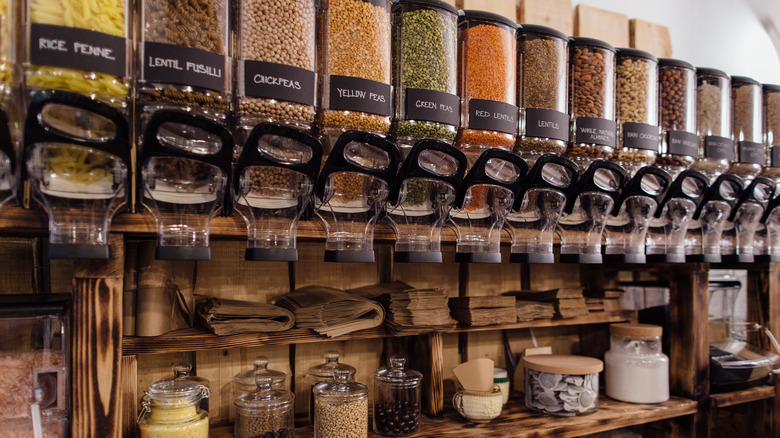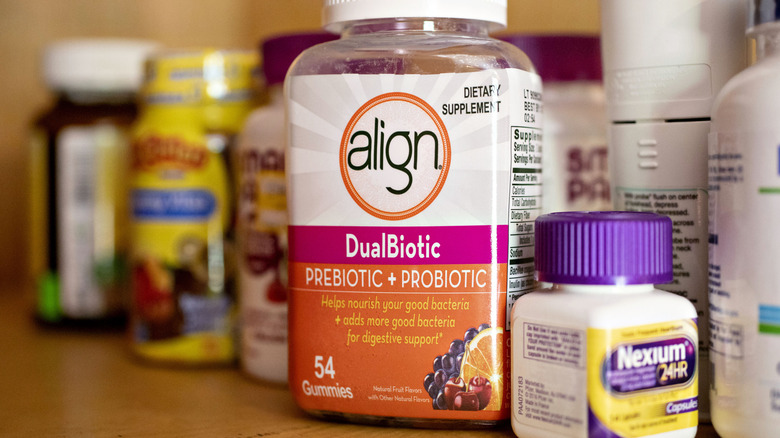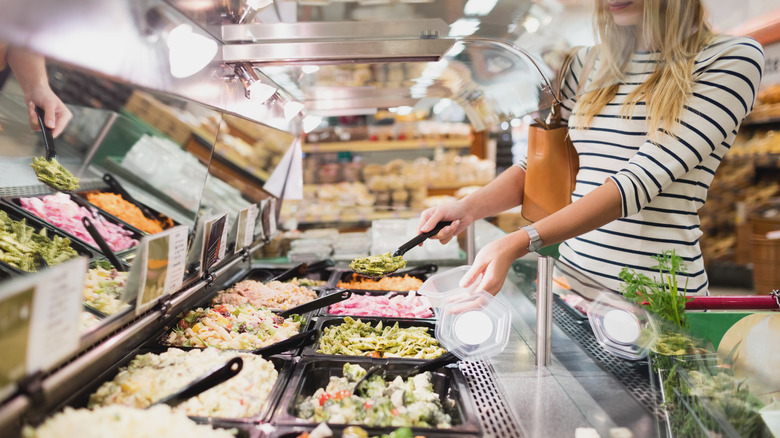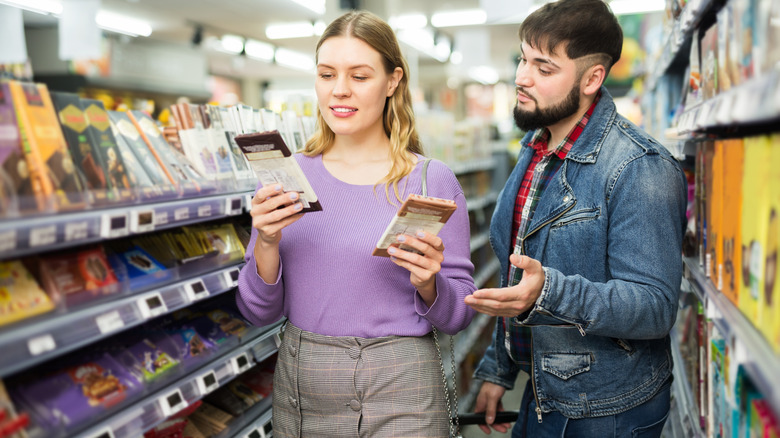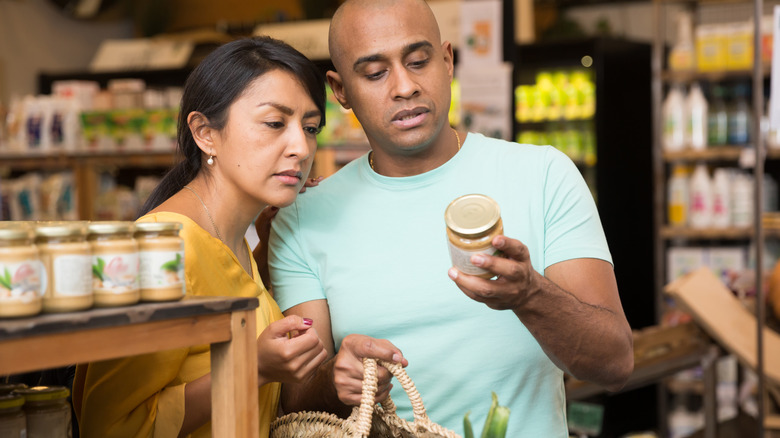The 12 Types Of Customers Who Shop At Whole Foods: Which One Are You?
What started as a tiny health food market in the heart of Austin, Texas in 1980, has morphed itself into an impressive international conglomeration of healthy foods and lifestyle products. The combination of humble beginnings (and the original "crunchy" customers) with the growing cache of organic products that calls to those with deep pockets and a desire to "fit in" has led to a broad-based customer appeal for the modern Whole Foods Market.
This means that on any given Saturday morning, you're bound to run into the stay-at-home mom looking to stock up on safe, chemical-free cleaning products for her home, or the corporate public relations executive buying cases of craft beer and organic wine to impress their clients at a weekend meet-and-greet. The stereotypical Whole Foods customers are easy to spot based on their own set of matching looks and proclivities. Now all you have to ask yourself is, which one are you?
The True Hippie
To be honest, the original Whole Foods customers — those who were eating kale and making their own environmentally-conscious, reusable sanitary napkins before such things were popular — is a little more scarce in the grocery store today. This might be due to the rising price point of such items, or it may simply be because Whole Foods has gotten "too big," and less local, turning the hippies to seek out farmer's markets and "mom and pop" natural grocers.
That said, you'll still see the occasional VW van pull up outside of the Whole Foods as a makeup free woman sporting hemp clothing and Birkenstocks emerges with a hand-crocheted cross-body bag, her hair done in dreadlocks. As she enters the store, she'll skip all the pre-packaged goods and head straight for the bulk foods and grind-your-own peanut butter sections where she'll pull reusable containers out of her bag to fill and take home in an effort to live "waste free."
The Homeschooling Mom
On a random Wednesday morning around 9:00 a.m., you're likely to see a mini van pull up outside of Whole Foods where a mom and anywhere from three to seven kids all pile out and high-tail it through the parking lot for their next homeschool lecture on healthy eating. Really, it's an excuse for this homeschool mom to get her shopping done while still making it "educational." Plus, Whole Foods has the exotic fruits and veggies she needs for her lesson on the culturally-accurate cuisine in the South Pacific, and the cheesecloth she needs for her lesson on cheese-making.
Just don't expect the kids to follow her around like well-behaved school children on a field trip. No, she believes in "free range parenting," and wants her kids to "learn by doing," giving them each a list of products they need to find on their own and bring back to her before she commences her lecture on the difference between organic, cage-free, and free-range eggs. So don't be shocked when three-year-old Raven and six-year-old Paz shove past you to grab the last package of recycled toilet paper before scurrying off to locate a jackfruit. This is all part of their homework, after all.
The Rich, Young Professional
For all the crunchy, granola types who regularly visit Whole Foods, there are at least as many individuals with a high expendable income and the desire to "keep up with the Jones'." These individuals want to increase their social standing by aligning themselves with the branding that Whole Foods offers — premium labels, organic and healthy foods, and, of course, expensive products. So when the rich, young professional walks through the doors, it's not necessarily because he, personally, is all that into organic produce (he'll probably look longingly at the basic bananas before grabbing the imported dragon fruit he doesn't know how to open or eat). Rather, this dude knows that other people in his circle shop at Whole Foods and place a premium on the status that the brand provides. You can spot him based on his slick, late-model BMW, Gucci shoes, and the Apple AirPods he has stuck in his ears.
That means that when the rich, young professional wants to impress a new love interest, there's no better way to start the night off right than with a couple Whole Foods bags sitting on the counter, right next to the bouquet of tropical flowers, a bowl of dragon fruit, and a particularly expensive bottle of organic French wine. It's a way of saying, "I've spared no expense," without actually speaking a single word.
The Rich Housewife
The rich housewife counterbalances the rich young professional in that her wardrobe, hair, makeup, and jewelry are probably five times more expensive than his, but it's so casual, you wouldn't know unless you know. But, let's be honest, in the "who's who" of Whole Foods shoppers, there are lots of other women (and men) who can easily spot the designer yoga pants, $500 sneakers, and limited edition Chanel purse that she so casually leaves in her shopping cart as she carefully reads ingredient lists for gluten-free cereal.
In all likelihood, she doesn't need to do the shopping. She has a personal assistant to help her with her day-to-day duties, but her expensive and (what some might call) picky tastes aren't limited to her activewear wardrobe. She subscribes to the "you get what you pay for" line of thinking, and she's willing to pay top dollar to make sure no corner is cut when it comes to feeding her family.
The Magazine Browser
Think of the magazine browser as a fringe hanger-on in the modern Whole Foods store. Maybe it's the health-conscious mom on a serious budget, or the college student who really wants to fill her cart with gourmet frozen pizzas, but knows her choice is to buy Whole Foods or textbooks, not both. And yet, the draw of the store is too great, and the selection of health-conscious magazines too wide — the magazine browser will spend hours sipping a coffee from the cafe while perusing titles like Bare, Sift, Yoga, Mother Jones, Naturally, Clean Eating, and even Hemp.
Will the Browser ever actually purchase one of these magazines? Probably not. At roughly $5.00 a pop, it's a hefty price to pay when the subscriptions are likely free on her Kindle account. But then again, it's not really about the magazines, now is it? It's about the Whole Foods experience, and the Magazine Browser just wants to be a part of it all, tight budget or not.
The Price Hound
Look, Whole Foods isn't a discount store. And while occasionally there are deals to be had, you know walking in that you're going to be paying a premium for your grass fed steak, free range organic eggs, chemical-free tampons, and locally made raw goat cheese. The thing is, the people who shop there know what they're getting themselves into, but the Price Hound is the type of "millionaire next door" who made their fortune not by raking in five-figure sales bonuses at a Fortune 500 company as a high-level executive, but by pinching every penny, cutting every corner, and getting by with the bare minimum for almost their whole lives.
And now, as this Baby Boomer starts recognizing the long-term financial benefits of living a healthier lifestyle, they're determined to clean up their fridge and pantry with a weekly trip to Whole Foods. But just because they're now willing to pry open their wallet (just a hair), that doesn't mean they like it. Oh no, you will spot the Price Hound by the well-maintained 1995 Toyota Corolla they roll up in, and the Costco jeans and t-shirt they wear to tour the aisles. You may also hear comments like, "A dollar each for organic bananas?! That's highway robbery! I'll take two bunches, please." Because even though Whole Foods prices are high, they're still a lot lower than doctor's visits and home health care.
The Bulk Bin Rule Breaker
The bulk bin section of Whole Foods is like Disneyland for the health-conscious consumer. Whether you're looking for raw pistachios, chipotle chili powder, or dark chocolate covered organic fair-trade coffee beans, you're bound to find a bin for that. But here's the deal: There are rules to follow when using the bulk bins. First, you need to choose the correct type of container (bonus points if you bring your own reusable containers from home), then after decanting the amount of a given item you want into said container, you must note the correct SKU for the product, weigh the container, and print a price label. Or, at a minimum, you need to write down the correct SKU for the cashier to use at checkout.
Here's the thing: The bulk bin rule breakers don't believe in "conforming to societal expectations." Rather, they'll use the bins as a way to "stick it to the man" and just do what makes sense to them. So, they'll ignore the SKU system altogether, leaving it up to the cashier to "do their job and figure it out" when they reach the checkout line. Or, perhaps they're purposely putting a lower-priced (non-organic, non-fair-trade) SKU on the higher-end item to save a few bucks. Or, maybe they misinterpreted the per-pound pricing for the grind-your-own almond butter and when they realized how much a whole pound would cost, they just leave the container for someone else to deal with.
The Supplement Guru
Whole Foods has a better supplement aisle than most grocery stores. It's especially helpful for anyone following a specialty diet, as they offer multiple options for those adhering to the latest vegan, paleo, keto, gluten-free, soy-free, dairy-free, non-GMO crazes promoted by the "health gurus" on Instagram. But the Whole Foods Supplement Guru doesn't need help or advice when it comes to finding the "very best" vegan protein powder or organic krill oil (after all, krill oil is better than fish oil ... or didn't you know?). Rather, he's there to check out the latest shipment of new products (all of which he's already done research on) and to school you on what vitamins you should really be purchasing. ("The bioavailability of most multi-vitamins is actually very low ... you should really get blood work done to determine where you have deficiencies and only purchase those specific vitamins in higher doses. And really, vitamin C won't help prevent a cold, but if you take very high doses at the onset, it might help shorten your symptoms.")
And don't worry, you don't need to ask for help, he's right there willing to offer more unsolicited advice than you've ever wanted to hear — he has a few hours to kill before he needs to take his pre-workouts and hit the gym.
The Crunchy Remote Worker
Sure, there's a Starbucks right next door to the Whole Foods — it's home to more than its fair share of remote workers — but the remote workers you'll find posted up at the Whole Foods café are a little more ... crunchy. In fact, choosing Whole Foods over Starbucks is part of their virtue signaling. They want everyone to know they're willing to pay (even more) than you would at Starbucks for a cup of coffee if they know it's organic and fair trade.
And despite the obvious corporate overlords who rule Whole Foods' existence, the cafe's sandwiches, soups, and salads are still more likely to appeal to the health-conscious digital nomad who's personal social media feed needs to align with the environmentally-friendly mission of the completely remote, vegan skincare company they work for. You'll spot them by their organic cotton t-shirt and flip flops made from recycled yoga mats.
The Lunch Crew
The Lunch Crew is basically the popular kids in high school, all grown up. They have high-paying jobs in marketing, public relations, and web design; they always seem put together, and they breeze into Whole Foods with smiles on their faces to "grab a quick lunch" from the salad bar. As they pile their containers high with falafel, risotto, kale and cranberry salad, and wild-caught Alaskan salmon, they seem not to worry about the ever-increasing price of the "sold by weight" lunch they're compiling.
So when it comes to a whopping $22.00 at checkout, they simply laugh and say, "good thing work gives us a lunch stipend!" as they add a bottle of crisp white wine to the register. (Sure, they're not supposed to drink on their lunch break, but a glass or two just helps with those creative juices, right?) As a group they'll post up at a table outside and enjoy their lunch together — just like they did back in high school.
The Lecturer
Imagine The Lecturer as the Supplement Guru, but without the confines of the supplement aisle. The Lecturer is happy to let anyone throughout Whole Foods know that "just because it says organic, that doesn't mean it's healthy." Their primary targets are their own family members, but when family and friends stop accompanying them to Whole Foods because it's such an annoying undertaking, watch out: Anyone can fall into their trap.
So when you go to grab an organic watermelon, and you hear someone pipe up with, "You know, organic is a good choice, but since you don't eat the rind of the watermelon, it's unlikely to be as tainted by pesticides. You could save a few dollars and choose non-organic in this case ... you know, if you want to be smart about things," just pretend you don't realize they're talking to you. Then make sure you walk away quickly. If you make eye-contact or otherwise acknowledge the advice, you may not shake your new know-it-all friend.
The Healthy Couple
The Whole Foods Healthy Couple likely met at a free lecture on the health benefits of a plant-based diet hosted by their local university's continuing education department. Or, perhaps they joined the same free yoga class offered at a city park. Either way, they hit it off immediately, and walked (or rode bikes) to the nearby Whole Foods Market to grab a quick coffee as a way to continue their conversation. This first date morphed into a tradition, and at least once a week you can find the couple casually strolling the aisles (often hand-in-hand), discussing the merits of chia seeds, hemp protein, and whether they should use endive or kale as the base of their homemade, date night salad.
The thing is, a trip to Whole Foods is a romantic experience for them, so they'll take their time, enjoy a few free samples, and pick up a bottle of wine, fresh berries, and dark chocolate as a part of the excursion. They're so consumed by their love for each other (and for the fresh baked, multi-grain bread they just scored to dip in the imported extra virgin olive oil they have at home) that they don't realize a date night at Whole Foods is a little unusual.
